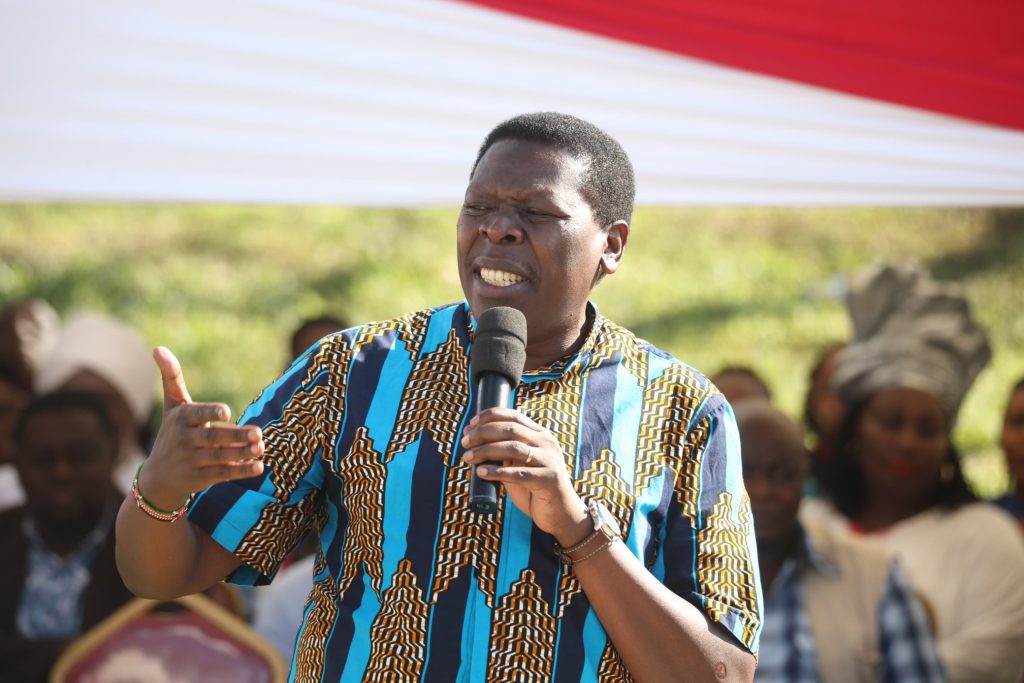Former Defence Cabinet Secretary Eugene Wamalwa has recalled a particular moment from his younger days when he and his drama team staged a controversial anti-government play before President Moi at State House, Nairobi.
Speaking during an interview with a local television station on Monday, April 14, 2025, Wamalwa drew a striking comparison between President Moi and President William Ruto, arguing that Moi, despite being a seasoned ruler, never appeared threatened by plays that boldly criticised the government’s failings.
According to Wamalwa, the play they performed back then centred on the injustices of colonialism during the construction of the Kenya–Uganda Railway—a piece he described as far more scathing in tone and message than the recent ‘Echoes of War’ by Butere Girls—and yet, despite its audacity, Moi simply sat through the entire performance without interruption.
“I was a drama enthusiast, and back then I was a student at Gendi School, where I emerged as one of the best actors during my O-levels and later my A-levels,” Wamalwa recounted. “We staged a political play revolving around the colonial context of the railway’s construction and the oppressive treatment of the Maasai by the colonial powers. But Moi still allowed us to present it.”
Wamalwa went on to reveal that he had taken on the role of the white colonialist—a mzungu character who collaborated with the government to perpetuate the abuse and exploitation of Africans. He shared that, even with his lines being raw and brutally direct, Moi never once called for the banning of the performance.
“In that role, I said some very unkind things as I played the mzungu overseeing the railway construction and mistreating Africans. I was portraying the worst of colonial atrocities—committed by previous administrations—and even so, Moi never moved to censor us.”

He emphasised that although Moi’s composure visibly shifted at certain points, especially when the play touched on delicate political nerves, the President still allowed the team to perform without restriction—something Wamalwa says speaks volumes about his tolerance for critique.
“In that performance, Moi sat there and watched; at some point, I even noticed him frowning, but we were still permitted to continue, because what we were doing was pure art, and I was just delivering the lines.”
Wamalwa further delved into another moment from his theatre days, recalling a separate production in which they reached the national level with a play based on the “Dobby Twins”—a deeply symbolic piece that unflinchingly exposed societal decay, widening inequality, corruption, and moral breakdown.
However, they cleverly masked the play as being set in a fictional Russian state, a tactic Wamalwa praised as classic satire—an artistic device he described as essential for creative expression that wishes to challenge power without falling victim to censorship.
“We camouflaged it as if it were a Russian country experiencing these problems, not Kenya, and that saved the play from any backlash. Satire remains one of the most powerful tools we have for telling the truth safely.”
Even so, Wamalwa could not resist taking a swipe at President Ruto’s administration, saying he still struggles to comprehend why the Butere Girls’ Echoes of War was banned, given that its themes were not even close to the sharp critique that characterised plays during his youth.
“In that other role, I was portraying the Dobby Twins, and with my fellow actor Nicoli Gogo, we exposed a society plagued by corruption, division, and promiscuity. And yet we did it through satire, and it was accepted. So now I ask myself, why is it suddenly wrong when our children are doing the same?”
Echoes of War
The Butere Girls’ 2025 play ‘Echoes of War’, which had initially been banned at the regional drama festivals before being reinstated through a court ruling, tells the gripping story of Mustafa, a gifted computer science student living under the fictional Kingdom of Royal Velvet Emirates.
His life takes an extraordinary turn when he develops a groundbreaking telemedicine platform that earns him the praise of the ruling sultan.
However, the tides turn when old social media posts emerge in which he had openly criticised the Sultan’s leadership. This triggers a dramatic descent into political persecution, digital surveillance, and public rejection.
The play unravels deeply resonant themes around power, technology, freedom of expression, and the chilling cost of dissent in modern society.